定语从句详解(江苏省南京市)
图片预览
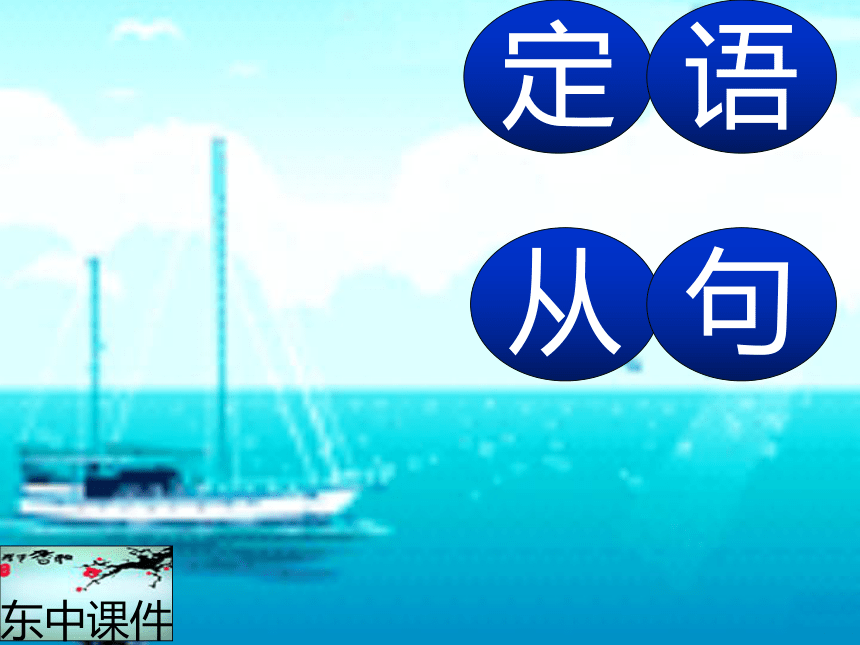
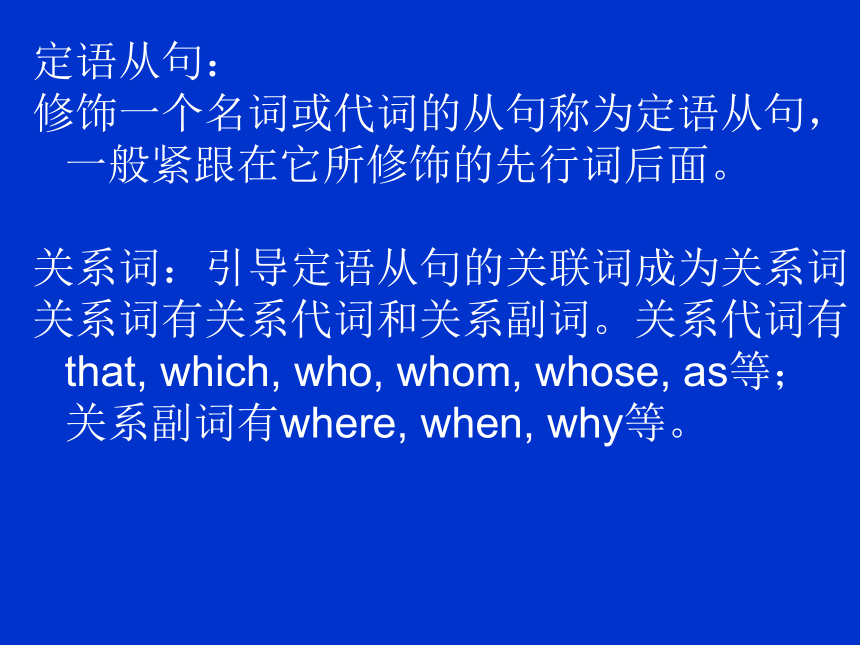
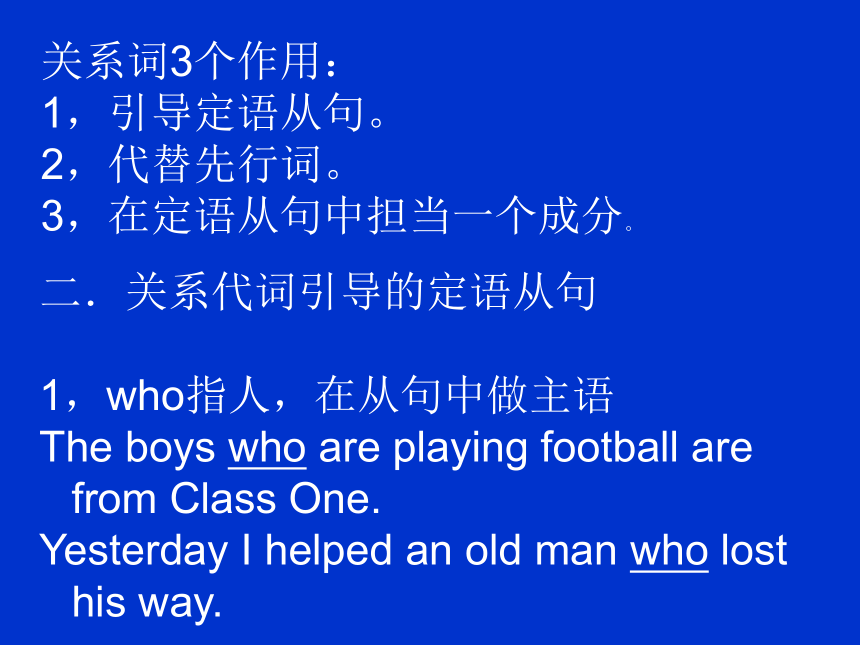

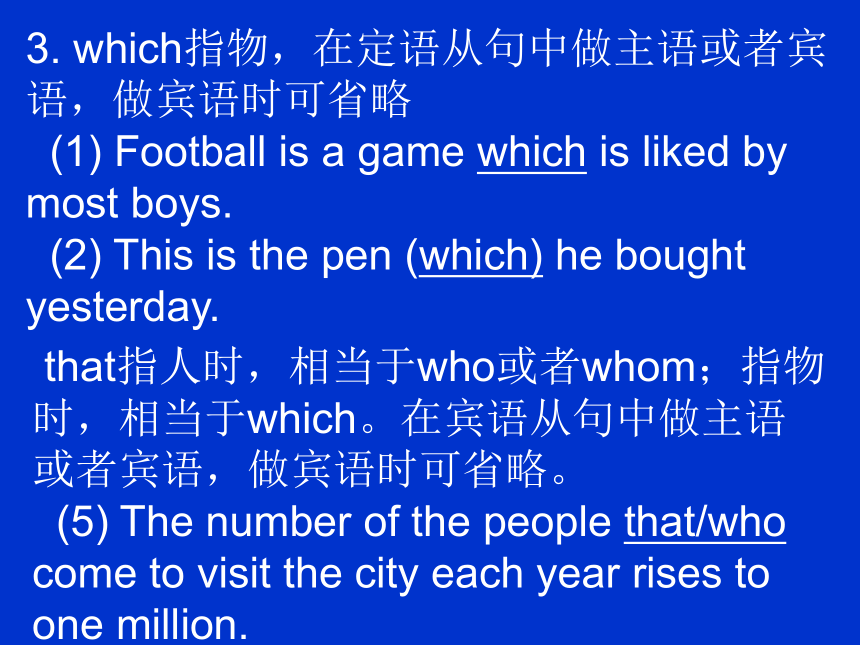
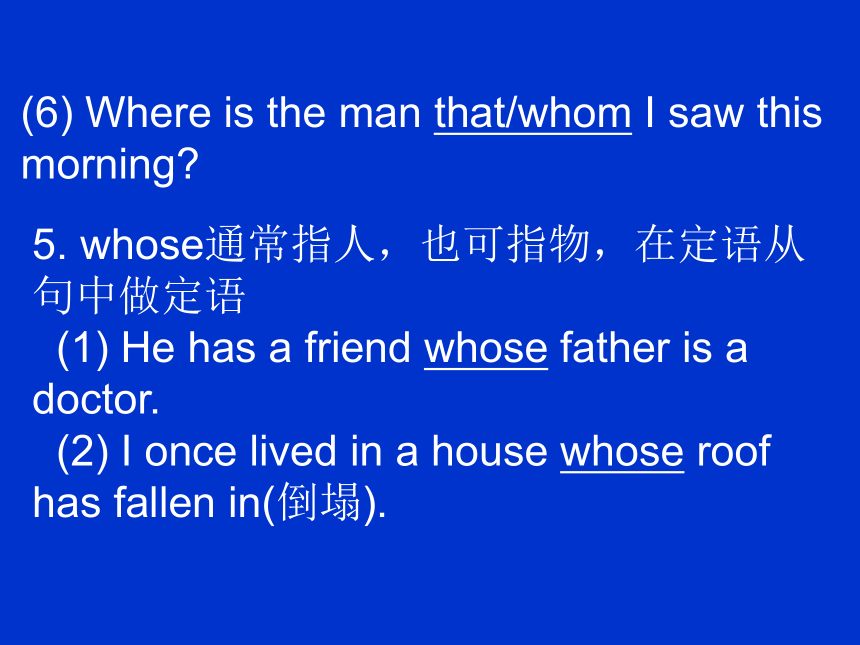
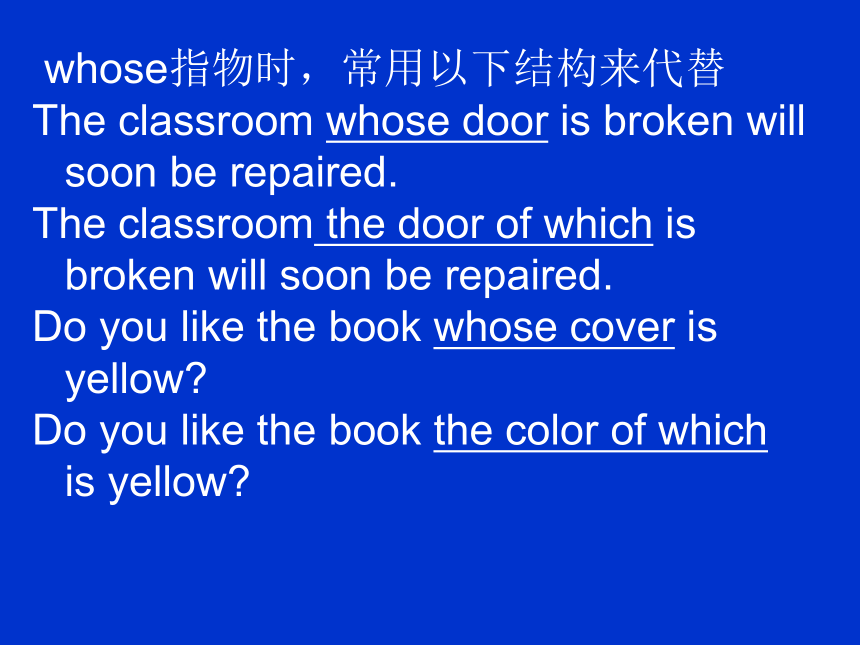
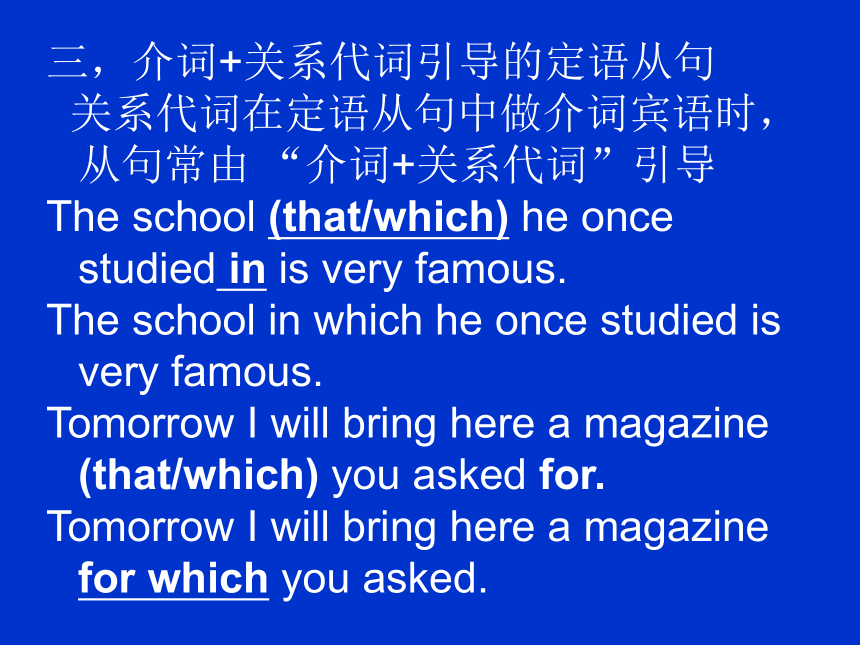

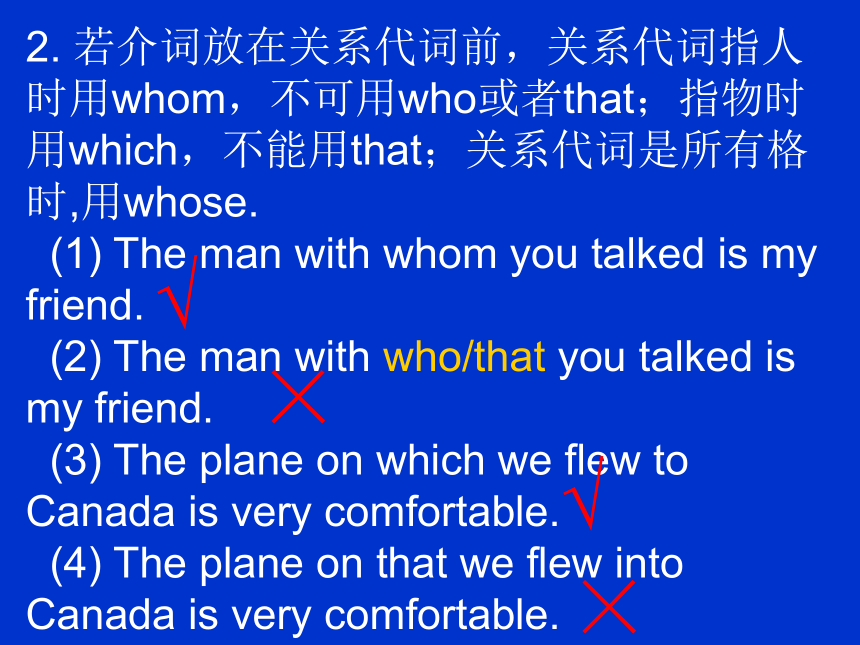

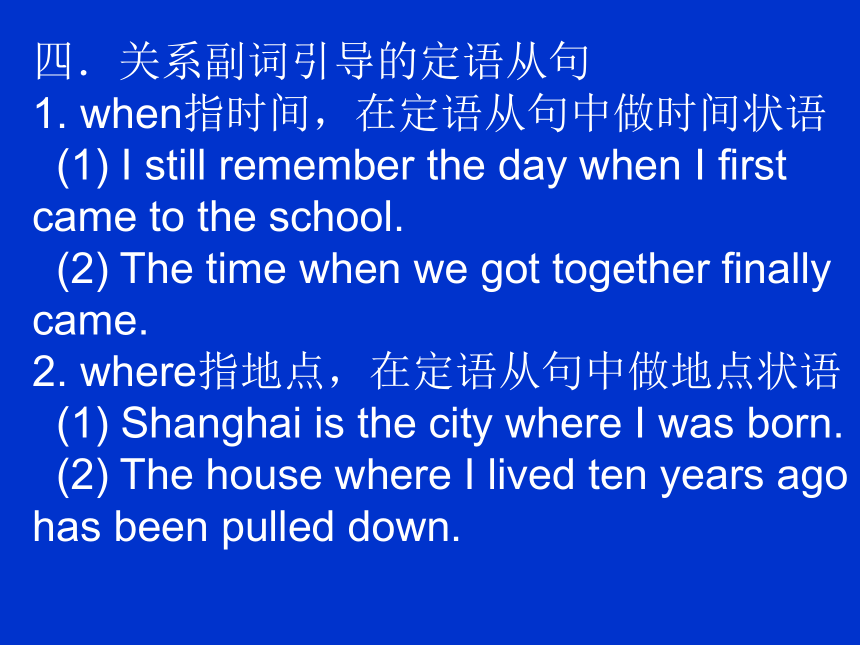
文档简介
课件32张PPT。
东中课件定语从句:
修饰一个名词或代词的从句称为定语从句,一般紧跟在它所修饰的先行词后面。
关系词:引导定语从句的关联词成为关系词
关系词有关系代词和关系副词。关系代词有that, which, who, whom, whose, as等;关系副词有where, when, why等。
关系词3个作用:
1,引导定语从句。
2,代替先行词。
3,在定语从句中担当一个成分。二.关系代词引导的定语从句
1,who指人,在从句中做主语
The boys who are playing football are from Class One.
Yesterday I helped an old man who lost his way.2, whom指人,在定语从句中充当宾语,常可省略。
(1) Mr. Liu is the person (whom) you talked about on the bus.
(2) Mr. Ling is just the boy whom I want to see.
注意:关系代词whom在口语和非正式语体中常用who代替,可省略。 (3) The man who/whom you met just now is my friend.3. which指物,在定语从句中做主语或者宾语,做宾语时可省略
(1) Football is a game which is liked by most boys.
(2) This is the pen (which) he bought yesterday. that指人时,相当于who或者whom;指物时,相当于which。在宾语从句中做主语或者宾语,做宾语时可省略。
(5) The number of the people that/who come to visit the city each year rises to one million. (6) Where is the man that/whom I saw this
morning?5. whose通常指人,也可指物,在定语从句中做定语
(1) He has a friend whose father is a doctor.
(2) I once lived in a house whose roof has fallen in(倒塌). whose指物时,常用以下结构来代替
The classroom whose door is broken will soon be repaired.
The classroom the door of which is broken will soon be repaired.
Do you like the book whose cover is yellow?
Do you like the book the color of which is yellow?三,介词+关系代词引导的定语从句
关系代词在定语从句中做介词宾语时,从句常由 “介词+关系代词”引导
The school (that/which) he once studied in is very famous.
The school in which he once studied is very famous.
Tomorrow I will bring here a magazine (that/which) you asked for.
Tomorrow I will bring here a magazine for which you asked.
We’ll go to hear the famous singer (whom/that/who) we have often talked about.
We’ll go to hear the famous singer about whom we have often talked.
注意:1. 含有介词的动词短语一般不拆开使用,如:look for, look after, take care of等
This is the watch which/that I am looking for.
This is the watch for which I am looking. √ × 2. 若介词放在关系代词前,关系代词指人时用whom,不可用who或者that;指物时用which,不能用that;关系代词是所有格时,用whose.
(1) The man with whom you talked is my friend.
(2) The man with who/that you talked is my friend.
(3) The plane on which we flew to Canada is very comfortable.
(4) The plane on that we flew into Canada is very comfortable. √ √ × × “介词+关系代词”前可有some, any, none, both, all, neither, most, each, few等代词或者数词
(1) He loved his parents deeply, both of whom are very kind to him.
(2) In the basket there are quite many apples, some of which have gone bad.
(3) There are forty students in our class in all, most of whom are from big cities.四.关系副词引导的定语从句
1. when指时间,在定语从句中做时间状语
(1) I still remember the day when I first came to the school.
(2) The time when we got together finally came.
2. where指地点,在定语从句中做地点状语
(1) Shanghai is the city where I was born.
(2) The house where I lived ten years ago has been pulled down.3. why指原因,在定语从句中做原因状语
(1) Please tell me the reason why you missed the plane.
注意:关系副词“介词+关系代词”引导的从句替换
The reason why / for which he refused the invitation is not clear,
From the year when / in which he was going to school he began to know what he wanted when he grew up.
Great changes have taken place in the city where / in which I was born.
限定性定语从句与
非限定性定语从句的区别限制性定语从句举例:
The teacher told me that Tom was the only person that I could depend on.
China is a country which has a long history..非限制性定语从句举例:
His mother, who loves him very much, is strict with him.
China, which was founded in 1949, is becoming more and more powerful.这两句可否去掉逗号变成限定性定语从句? 要注意区分以下几个句子的不同
His brother who is now a doctor always encourages him to go to college.
他那当医生的哥哥常鼓励他要考上大学。(他还有其他的哥哥)
His brother, who is now a doctor, always encourages him to go to college.
他的哥哥是当医生的,常鼓励他要考上大学。(他只有一个哥哥)难点分析
(一)限制性定语从句只能用that的几种情况
1.当先行词是anything, everything, nothing, few, all, none, little, some等代词时,或者是由every, any, all, some, no, little, few, much等修饰时.
(1) Have you taken down everything (that) Mr. Li has said?
(2) There seems to be nothing that seems impossible for him in the world.
(3) All that can be done has been done.
(4) There is little (that) I can do for you.2. 当先行词被序数词修饰
(1) The first place that they visited in London was the Big Ben.
3. 当先行词被形容词最高级修饰时
(1) This is the best film that I have seen.
4. 当形容词被the very, the only 修饰时
(1) This is the very dictionary that I want to buy,
(2) After the fire in his house, the old car is the only thing that he owned. 5. 当先行词前面有who, which等疑问代词时
(1) Who is the man that is standing there?
(2) Which is the T-shirt that fits me most?
6. 当先行词既有人,也有动物或者物体时
(1) Can you remember the scientist and his theory that we have learned?(二)关系代词as和which引导的定语从句
as和which引导非限制性定语从句,有相同之处也有不同之处。具体情况是:
1.As和which都可以在定语从句中做主语或者宾语,代表前面整个句子。
(1) He married her, as/which was natural.
(2) He was honest, as/which we can see.
2. as 引导非限制性定语从句,可放在主句之前,或者主句之后,甚至可以切割一个主句;which引导的非限制性定语从句只能放在主句之后。另外,as有“正如……,正像……”的意思(1) As is known to all, China is a developing country.
(2) He is from the south, as we can see from his accent.
(3) John, as you know, is a famous writer.
(4) He has been to Paris more than several times, which I don’t believe.
注意:当主句和从句存在逻辑上的因果关系时,常用which.
(5) Tom was always late for school, which made his teacher angry 3. 当先行词受such, so, the same修饰时,常用as.
(1) I have never heard such a story as he tells.
(2) He is not such a fool as he looks.
(3) This is the same book as I lost last week. 注意:当先行词由the same修饰时,偶尔也用that引导定语从句,但是和由as所引导的定语从句意思不同。 (4) She wore the same dress that she wore at Mary’s wedding. 她穿着她在玛丽婚礼上穿过的一条裙子。
(5) She wore the same dress as her young sister wore. 她穿着和她妹妹所穿的一样的裙子。(三)以the way为先行词的定语从句通常由in which, that引导,而且通常可以省略。
(1) The way in which/ that/./ he answered the question was surprising.(四) but有时也可以做关系词引导定语从句
(1) There are very few but understand his idea. ( but= who don’t )定语从句巩固与练习1.His parents wouldn’t let him marry anyone ______ family was poor.
A.of whom B.whom C.of whose D.whose
2.She heard a terrible noise, _____ brought her heart into her mouth.
A.it B.which C.this D.that
3.In the dark street , there wasn’t a single person _____ she could turn for help.
A.that B.who C.from whom D.to whom
4.The weather turned out to be very good , ____ was more than we could expect.
A.what B.which C.that D.it √ √ √ √ 5.After living in Pairs for fifty years he returned to the small town ____ he grew up as a child.
A.which B.where C.that D.when
6.Carol said the work would be done by October, __personally I doubt very much.
A. it B.that C.when D.which
7.Dorothy was always speaking highly of her role in the play, ________,of course , made the others unhappy.
A.who B.which C.this D.what √ √ √ 8.Recently I bought an ancient Chinese vase , _____ was very reasonable.
A. which price B. the price of which
C. its price D. the price of whose9._____ has already been pointed out , grammar is not a set of dead rules.
A. As B. It C. That D. Which 10.He lived in London for 3 months , during ____ time he learned some English.
A. this B. which C. that D. same√ √ √ 11.Oh the wall hung a picture, ____ color is blue.
A. whose B. of which C. which D. its12.Whenever I met him , ____ was fairly often, I like his sweet and hopeful smile.
A. what B. which C. that D. when
13.The visitor asked the guide to take his picture _____ stands the famous tower.
A. that B. where C. which D. there√ √ √ 14.The boss ____ department Ms King worked ten years ago look down upon women.
in which B. in that
C. in whose D. whose
15.I don’t like _____ you speak to her.
the way B. the way in that
C. the way which D. the way of which
16.I had neither a raincoat nor an umbrella , _____ I got wet through .
A. It’s the reason B. That’s why
C. There’s why D. It’s how√ √ √ 17.He made another wonderful discovery, ____ of great importance to science.
A. which I think is B. which I think it is
C. which I think it D. I think which is
18.He was very rude to the customs officer, ____ of course made things even worse.
A. who B. whom C. what D. whcih √ √ 20. Is this the museum ____ the exhibition was held.
A. where B. that C. on which D. the one
√ 19. Is this museum ___ you visited a few days age?
A. where B. that C. on which D. the one √
东中课件定语从句:
修饰一个名词或代词的从句称为定语从句,一般紧跟在它所修饰的先行词后面。
关系词:引导定语从句的关联词成为关系词
关系词有关系代词和关系副词。关系代词有that, which, who, whom, whose, as等;关系副词有where, when, why等。
关系词3个作用:
1,引导定语从句。
2,代替先行词。
3,在定语从句中担当一个成分。二.关系代词引导的定语从句
1,who指人,在从句中做主语
The boys who are playing football are from Class One.
Yesterday I helped an old man who lost his way.2, whom指人,在定语从句中充当宾语,常可省略。
(1) Mr. Liu is the person (whom) you talked about on the bus.
(2) Mr. Ling is just the boy whom I want to see.
注意:关系代词whom在口语和非正式语体中常用who代替,可省略。 (3) The man who/whom you met just now is my friend.3. which指物,在定语从句中做主语或者宾语,做宾语时可省略
(1) Football is a game which is liked by most boys.
(2) This is the pen (which) he bought yesterday. that指人时,相当于who或者whom;指物时,相当于which。在宾语从句中做主语或者宾语,做宾语时可省略。
(5) The number of the people that/who come to visit the city each year rises to one million. (6) Where is the man that/whom I saw this
morning?5. whose通常指人,也可指物,在定语从句中做定语
(1) He has a friend whose father is a doctor.
(2) I once lived in a house whose roof has fallen in(倒塌). whose指物时,常用以下结构来代替
The classroom whose door is broken will soon be repaired.
The classroom the door of which is broken will soon be repaired.
Do you like the book whose cover is yellow?
Do you like the book the color of which is yellow?三,介词+关系代词引导的定语从句
关系代词在定语从句中做介词宾语时,从句常由 “介词+关系代词”引导
The school (that/which) he once studied in is very famous.
The school in which he once studied is very famous.
Tomorrow I will bring here a magazine (that/which) you asked for.
Tomorrow I will bring here a magazine for which you asked.
We’ll go to hear the famous singer (whom/that/who) we have often talked about.
We’ll go to hear the famous singer about whom we have often talked.
注意:1. 含有介词的动词短语一般不拆开使用,如:look for, look after, take care of等
This is the watch which/that I am looking for.
This is the watch for which I am looking. √ × 2. 若介词放在关系代词前,关系代词指人时用whom,不可用who或者that;指物时用which,不能用that;关系代词是所有格时,用whose.
(1) The man with whom you talked is my friend.
(2) The man with who/that you talked is my friend.
(3) The plane on which we flew to Canada is very comfortable.
(4) The plane on that we flew into Canada is very comfortable. √ √ × × “介词+关系代词”前可有some, any, none, both, all, neither, most, each, few等代词或者数词
(1) He loved his parents deeply, both of whom are very kind to him.
(2) In the basket there are quite many apples, some of which have gone bad.
(3) There are forty students in our class in all, most of whom are from big cities.四.关系副词引导的定语从句
1. when指时间,在定语从句中做时间状语
(1) I still remember the day when I first came to the school.
(2) The time when we got together finally came.
2. where指地点,在定语从句中做地点状语
(1) Shanghai is the city where I was born.
(2) The house where I lived ten years ago has been pulled down.3. why指原因,在定语从句中做原因状语
(1) Please tell me the reason why you missed the plane.
注意:关系副词“介词+关系代词”引导的从句替换
The reason why / for which he refused the invitation is not clear,
From the year when / in which he was going to school he began to know what he wanted when he grew up.
Great changes have taken place in the city where / in which I was born.
限定性定语从句与
非限定性定语从句的区别限制性定语从句举例:
The teacher told me that Tom was the only person that I could depend on.
China is a country which has a long history..非限制性定语从句举例:
His mother, who loves him very much, is strict with him.
China, which was founded in 1949, is becoming more and more powerful.这两句可否去掉逗号变成限定性定语从句? 要注意区分以下几个句子的不同
His brother who is now a doctor always encourages him to go to college.
他那当医生的哥哥常鼓励他要考上大学。(他还有其他的哥哥)
His brother, who is now a doctor, always encourages him to go to college.
他的哥哥是当医生的,常鼓励他要考上大学。(他只有一个哥哥)难点分析
(一)限制性定语从句只能用that的几种情况
1.当先行词是anything, everything, nothing, few, all, none, little, some等代词时,或者是由every, any, all, some, no, little, few, much等修饰时.
(1) Have you taken down everything (that) Mr. Li has said?
(2) There seems to be nothing that seems impossible for him in the world.
(3) All that can be done has been done.
(4) There is little (that) I can do for you.2. 当先行词被序数词修饰
(1) The first place that they visited in London was the Big Ben.
3. 当先行词被形容词最高级修饰时
(1) This is the best film that I have seen.
4. 当形容词被the very, the only 修饰时
(1) This is the very dictionary that I want to buy,
(2) After the fire in his house, the old car is the only thing that he owned. 5. 当先行词前面有who, which等疑问代词时
(1) Who is the man that is standing there?
(2) Which is the T-shirt that fits me most?
6. 当先行词既有人,也有动物或者物体时
(1) Can you remember the scientist and his theory that we have learned?(二)关系代词as和which引导的定语从句
as和which引导非限制性定语从句,有相同之处也有不同之处。具体情况是:
1.As和which都可以在定语从句中做主语或者宾语,代表前面整个句子。
(1) He married her, as/which was natural.
(2) He was honest, as/which we can see.
2. as 引导非限制性定语从句,可放在主句之前,或者主句之后,甚至可以切割一个主句;which引导的非限制性定语从句只能放在主句之后。另外,as有“正如……,正像……”的意思(1) As is known to all, China is a developing country.
(2) He is from the south, as we can see from his accent.
(3) John, as you know, is a famous writer.
(4) He has been to Paris more than several times, which I don’t believe.
注意:当主句和从句存在逻辑上的因果关系时,常用which.
(5) Tom was always late for school, which made his teacher angry 3. 当先行词受such, so, the same修饰时,常用as.
(1) I have never heard such a story as he tells.
(2) He is not such a fool as he looks.
(3) This is the same book as I lost last week. 注意:当先行词由the same修饰时,偶尔也用that引导定语从句,但是和由as所引导的定语从句意思不同。 (4) She wore the same dress that she wore at Mary’s wedding. 她穿着她在玛丽婚礼上穿过的一条裙子。
(5) She wore the same dress as her young sister wore. 她穿着和她妹妹所穿的一样的裙子。(三)以the way为先行词的定语从句通常由in which, that引导,而且通常可以省略。
(1) The way in which/ that/./ he answered the question was surprising.(四) but有时也可以做关系词引导定语从句
(1) There are very few but understand his idea. ( but= who don’t )定语从句巩固与练习1.His parents wouldn’t let him marry anyone ______ family was poor.
A.of whom B.whom C.of whose D.whose
2.She heard a terrible noise, _____ brought her heart into her mouth.
A.it B.which C.this D.that
3.In the dark street , there wasn’t a single person _____ she could turn for help.
A.that B.who C.from whom D.to whom
4.The weather turned out to be very good , ____ was more than we could expect.
A.what B.which C.that D.it √ √ √ √ 5.After living in Pairs for fifty years he returned to the small town ____ he grew up as a child.
A.which B.where C.that D.when
6.Carol said the work would be done by October, __personally I doubt very much.
A. it B.that C.when D.which
7.Dorothy was always speaking highly of her role in the play, ________,of course , made the others unhappy.
A.who B.which C.this D.what √ √ √ 8.Recently I bought an ancient Chinese vase , _____ was very reasonable.
A. which price B. the price of which
C. its price D. the price of whose9._____ has already been pointed out , grammar is not a set of dead rules.
A. As B. It C. That D. Which 10.He lived in London for 3 months , during ____ time he learned some English.
A. this B. which C. that D. same√ √ √ 11.Oh the wall hung a picture, ____ color is blue.
A. whose B. of which C. which D. its12.Whenever I met him , ____ was fairly often, I like his sweet and hopeful smile.
A. what B. which C. that D. when
13.The visitor asked the guide to take his picture _____ stands the famous tower.
A. that B. where C. which D. there√ √ √ 14.The boss ____ department Ms King worked ten years ago look down upon women.
in which B. in that
C. in whose D. whose
15.I don’t like _____ you speak to her.
the way B. the way in that
C. the way which D. the way of which
16.I had neither a raincoat nor an umbrella , _____ I got wet through .
A. It’s the reason B. That’s why
C. There’s why D. It’s how√ √ √ 17.He made another wonderful discovery, ____ of great importance to science.
A. which I think is B. which I think it is
C. which I think it D. I think which is
18.He was very rude to the customs officer, ____ of course made things even worse.
A. who B. whom C. what D. whcih √ √ 20. Is this the museum ____ the exhibition was held.
A. where B. that C. on which D. the one
√ 19. Is this museum ___ you visited a few days age?
A. where B. that C. on which D. the one √
同课章节目录
